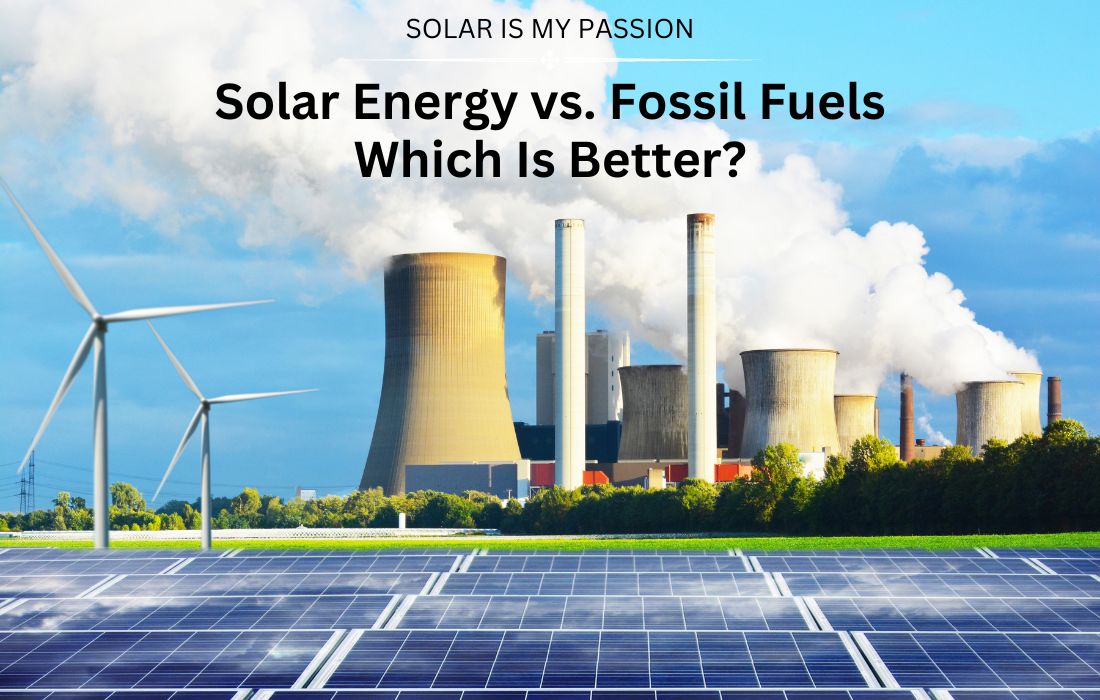In the search for alternative sources of energy, solar energy, and fossil fuels are two options that come up frequently. Both have their advantages and disadvantages, and it can be challenging to determine Solar Energy vs. Fossil Fuels: which one is better? In this article, we will compare solar energy and fossil fuels, and we’ll take a look at the pros and cons of each.
The Pros and Cons of Solar Energy
Solar energy is a renewable source of energy that is obtained from the sun. It is one of the cleanest and most abundant sources of energy, and it has several advantages over fossil fuels. Here are some pros and cons of solar energy:
Pros of Solar Energy:
- Solar energy is renewable and sustainable, which means it will never run out.
- It is a clean and green source of energy that doesn’t produce any greenhouse gases or air pollutants.
- It can be used in remote areas where it is difficult to connect to the grid.
- It has a low maintenance cost and can last for up to 25 years.
- It can reduce your energy bills and save you money in the long run.
Cons of Solar Energy:
- It requires a large initial investment to set up solar panels and infrastructure.
- It is dependent on sunlight and may not be reliable in areas with low sunlight or frequent cloud cover.
- The production of solar panels involves the use of toxic chemicals and materials, which can harm the environment.
- It may require additional storage capacity to store excess energy during times of low demand.
The Pros and Cons of Fossil Fuels
Fossil fuels, on the other hand, are non-renewable sources of energy that are obtained from the earth’s crust. They are the most commonly used sources of energy in the world, but they have several disadvantages. Here are some pros and cons of fossil fuels:
Pros of Fossil Fuels:
- Fossil fuels are easily accessible and widely available.
- They are cheap and can be used to generate large amounts of energy quickly.
- They are versatile and can be used to power transportation, heating, and electricity generation.
- They have a high energy density, which means they contain a lot of energy in a small amount of space.
Cons of Fossil Fuels:
- They are non-renewable and will eventually run out.
- They produce large amounts of greenhouse gases and air pollutants, which contribute to climate change and harm human health.
- They are a finite resource and their prices are subject to fluctuation.
- The extraction and transportation of fossil fuels can harm the environment and wildlife.
Solar Energy vs. Fossil Fuels: Which One Is Better?
Now that we have looked at the pros and cons of both solar energy and fossil fuels, we can make a comparison to determine which one is better. While both sources of energy have their advantages and disadvantages, solar energy seems to be the better option for several reasons:
- Renewable and sustainable: Solar energy is a renewable and sustainable source of energy that will never run out. Fossil fuels, on the other hand, are non-renewable and will eventually run out.
- Clean and green: Solar energy is a clean and green source of energy that doesn’t produce any greenhouse gases or air pollutants. Fossil fuels, on the other hand, produce large amounts of greenhouse gases and air pollutants that harm the environment and human health.
- Cost-effective: While the initial cost of setting up solar panels and infrastructure may be high, solar energy can save you money in the long run by reducing your energy bills. Fossil fuels, on the other hand, are subject to price fluctuations and can be expensive in the long run.
- Versatile: Solar energy can be used in a variety of applications, from powering homes and businesses to powering transportation. Fossil fuels, on the other hand, are primarily used for transportation and electricity generation.
- Renewable: Solar energy is a renewable source of energy that is constantly replenished by the sun. Fossil fuels, on the other hand, are finite resources that will eventually be depleted.
- Clean: Solar energy produces no greenhouse gas emissions or air pollution, making it a clean source of energy. Fossil fuels, on the other hand, emit large amounts of greenhouse gases and contribute to air pollution.
- Cost-effective: The cost of solar energy has been steadily declining over the years, making it an increasingly cost-effective option for homeowners and businesses. Fossil fuels, on the other hand, are subject to price volatility and are often subject to price spikes due to political instability and supply disruptions.
- Despite the many benefits of solar energy, there are still some challenges that need to be addressed. One of the main challenges is the intermittency of solar energy, which means that it can only produce power when the sun is shining. This can be mitigated by using energy storage systems to store excess energy produced during the day for use at night or during periods of low sunlight.
- Another challenge is the upfront cost of solar energy systems, which can be expensive for homeowners and businesses. However, there are many incentives and financing options available that can help offset the cost of installation.
- Subsidy: You will get subsidy benefits on the installation of a solar rooftop system but no subsidy is available for fossil fuel use.


